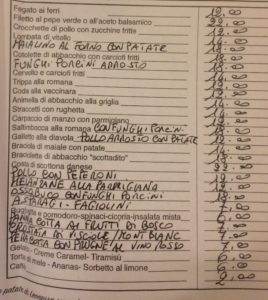Every travel writer talks about building good relations with the local culture by learning a few phrases of the local language and to not assume everyone speaks English. This is tied to the fear we have of being the “ugly American”, the American tourist who is too ignorant to understand that they are a visitor in a foreign country. I’m in agreement, I would never want anyone to think I’m demanding that English be spoken or that I feel some sort of special entitlement because I’m an American. I therefore learn as many key phrases and as much vocabulary as I can before I travel. I should add that I also enjoy learning a bit about the language and trying it out with the locals.
However, during my recent trip to Paris and Italy I realized that starting a conversation with a few French or Italian phrases was more often a frustration than a positive cultural connection. I also rarely felt anyone “appreciating” the fact that I was trying to speak their language. This was primarily true for the heavily trafficked tourist areas. In these areas most of the locals speak English to some extent. Starting a greeting and/or a question in the local language sets the expectation that you can hold a conversation, which I cannot. Then there is the awkward explanation that you don’t really speak the language and then needing to restart the conversation. This just slowed down very busy people.
This happened to us in a restaurant in Rome. It was an out-of-the way little place. We walked in and using the small amount of Italian I know, I said good evening and asked for a menu. Here is what we got:

After about 20 minutes of trying to decipher the menu, the waiter walked up with another menu and said l’inglese? They were really busy, he smiled but seemed a bit put out (typical for busy Italians).
A few days later we jumped into a taxi and I asked the driver in Italian to take us to a restaurant located on Campana. He seemed confused so I tried to pronounce it more carefully. It was not working. I finally showed him the address on my phone and he started laughing. Later I realized I was saying Campagna instead of Campana, I was basically saying “take me to a restaurant in the countryside” instead of a restaurant on Bell Street”!
What to do? I use the local greeting and then I might add “Hi”, just to show my native language is English. If I’m in a non-tourist establishment, like a pharmacy, I’ll use my most often used phrase “Pardon me, but do you speak English” (Bonjour Madam, hi, Pardon, parlez vous anglais)? You will usually get “a little” but sometimes a you’ll get a flat “no” in response. This is when your vocabulary words and miming capabilities come in handy. Just a side note; piecing together sentences can be dangerous but a single word can be enough. Instead of trying to parse together “could you tell me where the bathroom is located” just say “toilet” (most western European countries use this word for bathroom).
If, after getting past the business at hand out of the way and they have the time, I’ll try my hand at experimenting with the language. You will usually get corrected, which is a great way to learn!
Tip: load the Google Translate app on your phone and also type in addresses of your destination to show a taxi driver, for example, or better yet put it all in Tripit and all the information – phone numbers and addresses – of your destinations are at your finger tips.

